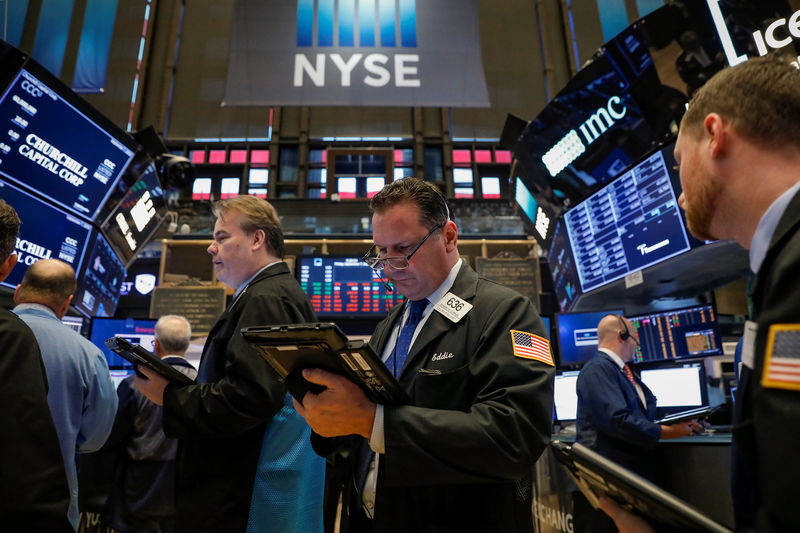By April Joyner
NEW YORK (Reuters) - U.S. technology and consumer discretionary stocks have been insulated from global trade tensions, but if another round of U.S. tariffs on Chinese goods goes into effect, even those high-flying sectors could come down to earth.
The United States and China have already imposed tariffs on $50 billion worth of each other's goods. The White House has proposed tariffs on an additional $200 billion worth of Chinese imports, including furniture, handbags and some computer parts.
U.S. President Donald Trump has said he is prepared to move forward with levies on an additional $267 billion - in essence, all Chinese imports into the United States.
The inclusion of consumer goods is a shift from previous rounds of U.S. tariffs, which have primarily hit the industrial sector. Shares of companies such as Boeing (NYSE:BA) Co and Caterpillar Inc (NYSE:CAT) have risen and fallen in tandem with trade sentiment.
On Wednesday, the Trump administration said that it invited Chinese officials to restart trade talks, which has been welcomed by Beijing. U.S. stocks have perked up on the news, but that optimism could be fleeting.
"Investors in general are too predisposed to react too positively to any signs of improvement in the situation," said Kristina Hooper, chief global market strategist at Invesco in New York. "I don't expect the (Trump) administration to back down."
Companies in the tech and consumer discretionary sectors have begun sounding alarm bells. A broad array of U.S. industry groups, representing companies such as Microsoft Corp (NASDAQ:MSFT), Amazon.com Inc (NASDAQ:AMZN), Walmart (NYSE:WMT) Inc and Mattel Inc (NASDAQ:MAT), has voiced opposition to the new tariffs.
Even Apple Inc (NASDAQ:AAPL), whose stock has contributed heavily to the S&P 500's gains, has warned that the proposed tariffs would affect several of its products, including the Apple Watch and AirPods headphones, though it did not mention the iPhone.
In part because of trade issues, shares of tech companies have gotten off to a rocky start in September. As of Thursday's close, the S&P 500 tech sector had fallen 1.2 percent this month, versus a 0.1 percent rise for the S&P 500 as a whole. S&P 500 consumer discretionary stocks had risen 0.2 percent, less than the 2 percent advance in industrial stocks.
"The next round of escalation really does impact the leadership of the market," said Lisa Shalett, head of investment and portfolio strategies at Morgan Stanley (NYSE:MS) Wealth Management.
In anticipation of heightened trade tensions, companies have built up inventory, which could have an adverse effect on supply chains later on, Shalett said. Inventory pile-ups have already pushed down pricing in the semiconductor industry. The Philadelphia SE Semiconductor Index had fallen 2.8 percent in September as of Thursday's close.
Consumer-oriented companies face a catch-22 in their response to tariffs. Those that compete on price, such as Walmart, will likely have to absorb the cost of levies, which will cut into their margins. But companies that pass costs onto consumers, as Apple has indicated it will do, risk dampening demand for their products.
Invesco's Hooper pointed to washing machines as an example. Tariffs on steel and aluminum caused Whirlpool Corp (NYSE:WHR) to raise prices on its appliances, and its second-quarter earnings slumped as a result.
To be sure, consumer electronics are flashier products than a washer-dryer set. And U.S. tech companies can skirt some tariffs by shipping Chinese-made parts directly to other countries for assembly and then importing the finished items into the United States, said Scott Yuschak, equity strategy analyst at SunTrust Advisory Services in Atlanta. The list of targeted items in the next round of tariffs excludes cell phones, for instance.
With such mitigating factors, many investors are reluctant to make sweeping changes to their portfolios, though Morgan Stanley's Shalett has recommended a rotation into defensive sectors.
Many are likely waiting for third-quarter earnings for more details on the impact of trade, said David Joy, chief market strategist at Ameriprise Financial (NYSE:AMP) in Boston.
But further signs of escalation in the U.S.-China trade war could quickly raise the stakes for the S&P's leading sectors. The final round of levies would include consumer electronic products imported from China. Some market watchers fear that China, which cannot match the United States in tit-for-tat tariffs, would respond by restricting U.S. companies' ability to sell products in the country.
"If you look at the broad base of technology, there isn't much impact at this point," said Daniel Morgan, portfolio manager at Synovus Trust Company in Atlanta. "But if you include the iPhone into tariffs, then that changes the whole game."
